Chakras
Root Chakra Balance: Know The Characteristics
The root chakra, also known as the Muladhara chakra, is the first of the seven chakras in the body. It is located at the base of the spine and is associated with the earth element. The root chakra is responsible for our sense of stability, security, and groundedness, both physically and emotionally.
When this chakra is balanced, individuals feel a sense of safety, security, and confidence in their daily lives. However, when imbalanced, individuals may feel anxious, fearful, and disconnected from their physical body and the earth.
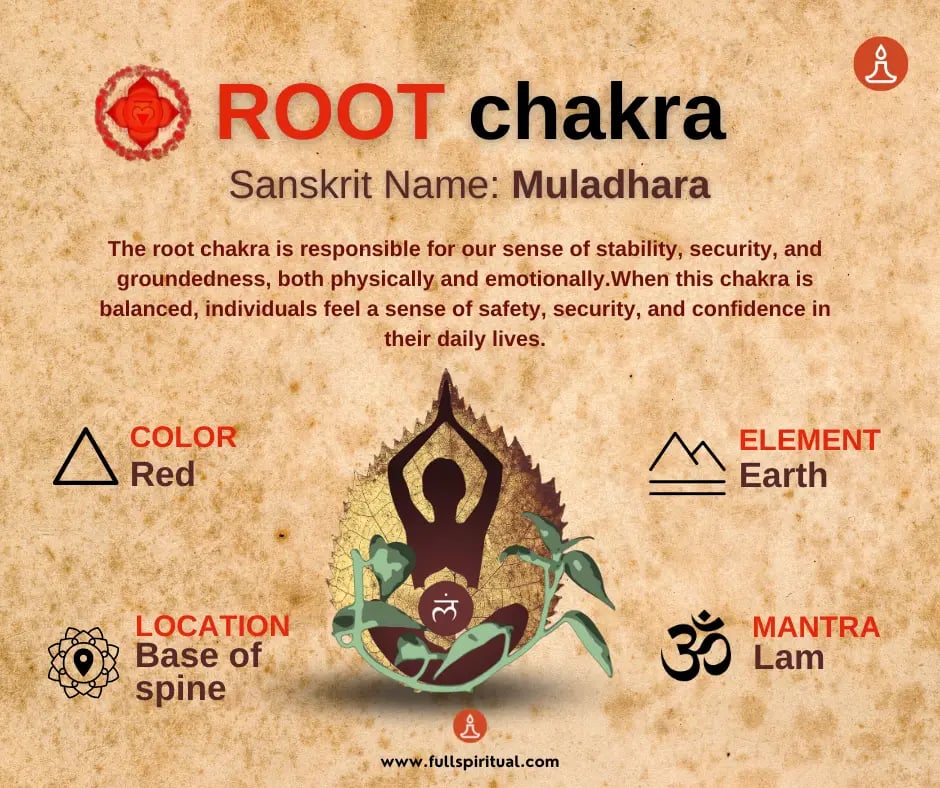
Characteristics of the Root Chakra
Understanding the unique characteristics of the root chakra can help us recognize when it is imbalanced and learn how to restore it to promote overall well-being.
By practicing techniques such as yoga, walking meditation, and lifestyle changes, we can balance our root chakra and cultivate a sense of groundedness, security, and success.
The root chakra is associated with the following characteristics:
- Grounding and stability: The root chakra provides a sense of physical and emotional grounding and stability, allowing us to feel connected to the world around us.
- Survival: This chakra is also associated with our basic survival needs, including food, shelter, and safety.
- Security: The root chakra influences our sense of security and helps us feel safe and protected.
- Physical health: A balanced root chakra is associated with physical health, particularly in the legs, feet, and lower back.
- Emotional health: It also impacts emotional health, influencing our ability to cope with stress and anxiety.
- Connection to nature: As the first chakra, the root chakra is closely linked to our connection to the natural world and our ability to live in harmony with it.
- Manifestation: Finally, this chakra is also associated with our ability to manifest our goals and desires in the physical world. When balanced, the chakra provides a strong foundation for success and achievement.
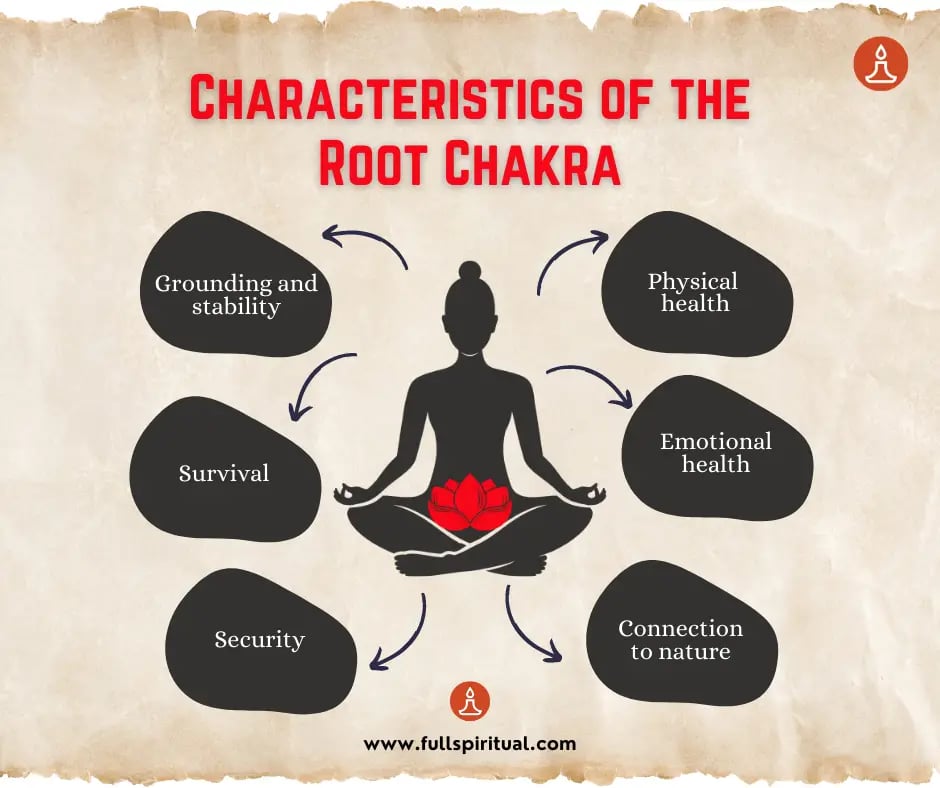
Signs of an Imbalanced Root Chakra
An imbalanced root chakra energy can manifest in a number of ways. Physically, you may experience issues with your legs, feet, lower back, or immune system. Emotionally, you may feel anxious, fearful, or insecure.
Mentally, you may struggle with focus, organization, or decision-making. Additionally, you may feel disconnected from your body or the physical world, or have a sense of being “stuck” in life.
Possible causes of root chakra imbalance include trauma, chronic stress, financial instability, or disconnection from nature.
When the root chakra is out of balance, individuals may experience physical and emotional symptoms. Some signs of an imbalance include:
- Anxiety and fear: This can lead to feelings of anxiety and fear, as well as a sense of disconnection from the physical body.
- Lack of energy: Imbalanced Muladhara can result in a lack of energy and motivation.
- Physical ailments: Imbalanced can lead to physical ailments such as back pain, digestive issues, and immune system disorders.
- Financial issues: Lead to financial issues and a sense of lack or scarcity.
- Disconnection from the earth: An imbalanced chakra can lead to a sense of disconnection from the earth and a lack of grounding.
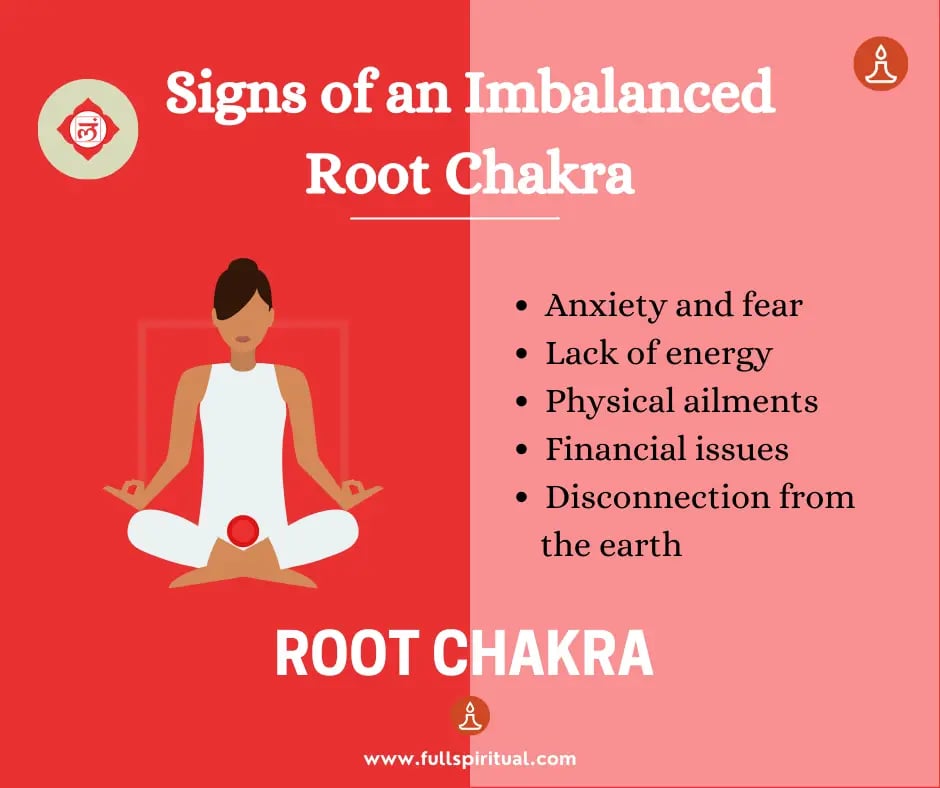
Balancing the Root Chakra
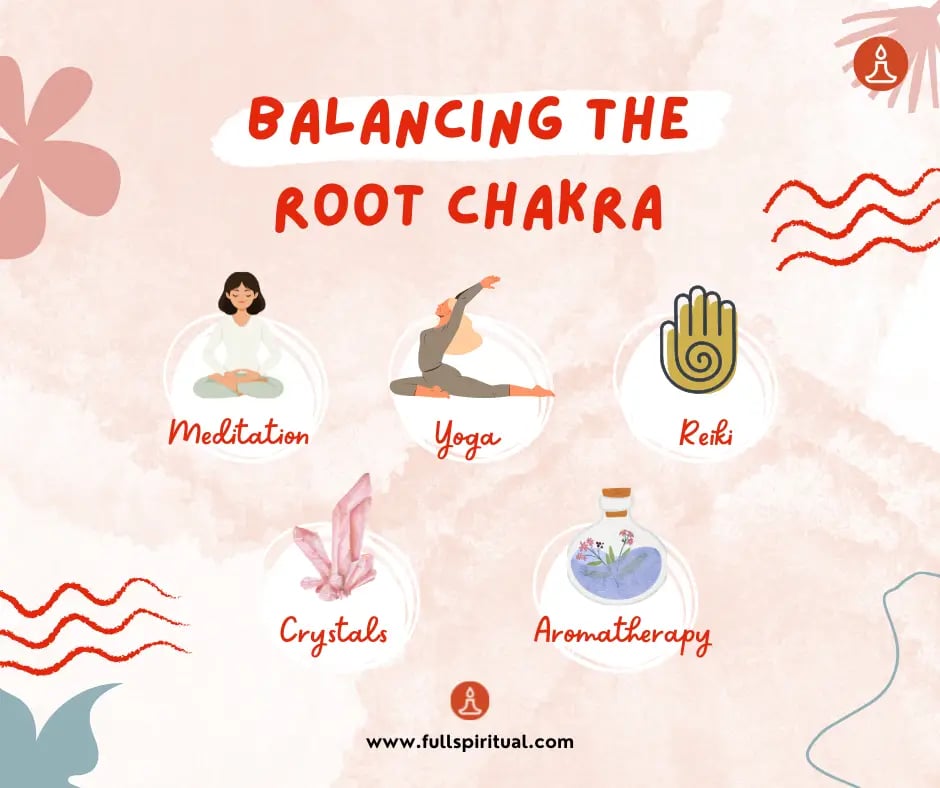
There are a number of ways to balance your root chakra. Yoga poses such as mountain and bridge poses can help to ground the body and strengthen the legs and lower back. Meditation and visualization practices, such as focusing on the color red or imagining roots extending from the base of the spine into the earth, can also be effective.
Dietary and lifestyle changes, such as incorporating more root vegetables and whole foods into your diet, spending time in nature, and practicing self-care, can also support root chakra healing.
Alternative therapies like acupuncture, energy healing, aromatherapy, and crystal therapy may also be helpful.
Here are some ways to balance the first chakra:
- Meditation: Sit in a comfortable position and focus on the area at the base of the spine. Visualize a red, spinning wheel of energy at this location.
- Yoga: Practice grounding yoga poses such as mountain pose or tree pose, which help to connect the body to the earth.
- Reiki: Seek the assistance of a Reiki practitioner who can help the root chakra healing using energy healing techniques.
- Crystals: Use grounding crystals such as black tourmaline, hematite, or red jasper to help align the root chakra.
- Aromatherapy: Use grounding essential oils such as patchouli, vetiver, or sandalwood to help to heal your root chakra.
It is important to note that these techniques may not work for everyone, and it is crucial to listen to one’s body and find what works best for them.
Balancing the root chakra is essential for overall health and well-being. A balanced first chakra allows us to feel grounded, stable, and secure which enables us to fully engage with the physical world.
If you are experiencing symptoms of a muladhara chakra imbalance, there are a number of practices and therapies you can try to bring your energy back into balance.
With time and consistent effort, you can cultivate a strong and resilient foundation for your physical, emotional, and spiritual health.
How is the root chakra related to the sacral chakra?
The root chakra and the sacral chakra are both part of the seven-chakra system that runs along the spine. While the root chakra is located at the base of the spine, the sacral chakra is located just above it, in the lower abdomen.
The root chakra is associated with grounding, stability, and survival, while the sacral chakra is associated with creativity, pleasure, and emotional balance. Both chakras are considered foundational to our physical and emotional health, and imbalances in either chakra can affect the other.
For example, a blockage or imbalance in the root chakra may lead to feelings of instability and fear, which can inhibit creativity and emotional expression. Similarly, an imbalance in the sacral chakra can make it difficult to connect with our bodies and experience pleasure, which can also impact our sense of grounding and stability.
Balancing both the root and sacral chakras can help us to feel more grounded, connected, and emotionally stable, promoting overall health and well-being. Practices like yoga, meditation, and energy work can be effective ways to balance and restore these chakras.
Affirmation to balance root chakra?
Affirmations are positive statements that can be repeated out loud to help balance and unblock imbalanced chakras, enhancing their positive aspects.
To balance the root chakra, there are a number of affirmations that can be used. Some of these affirmations include:
- I am grounded and rooted in the present moment.
- I am safe and secure in my body and in the world around me.
- I trust that my needs will be met and that I have everything I need to thrive.
- I am resilient in the face of adversity and capable of overcoming challenges.
- I release fear and anxiety and embrace a sense of calm and stability.
- I am worthy of love, respect, and abundance.
- I honor my body and treat it with kindness and respect.
- I am connected to the natural world and feel a deep sense of belonging.
- I trust in the journey of life and know that I am exactly where I need to be.
- I am strong and capable of achieving my goals and fulfilling my purpose.
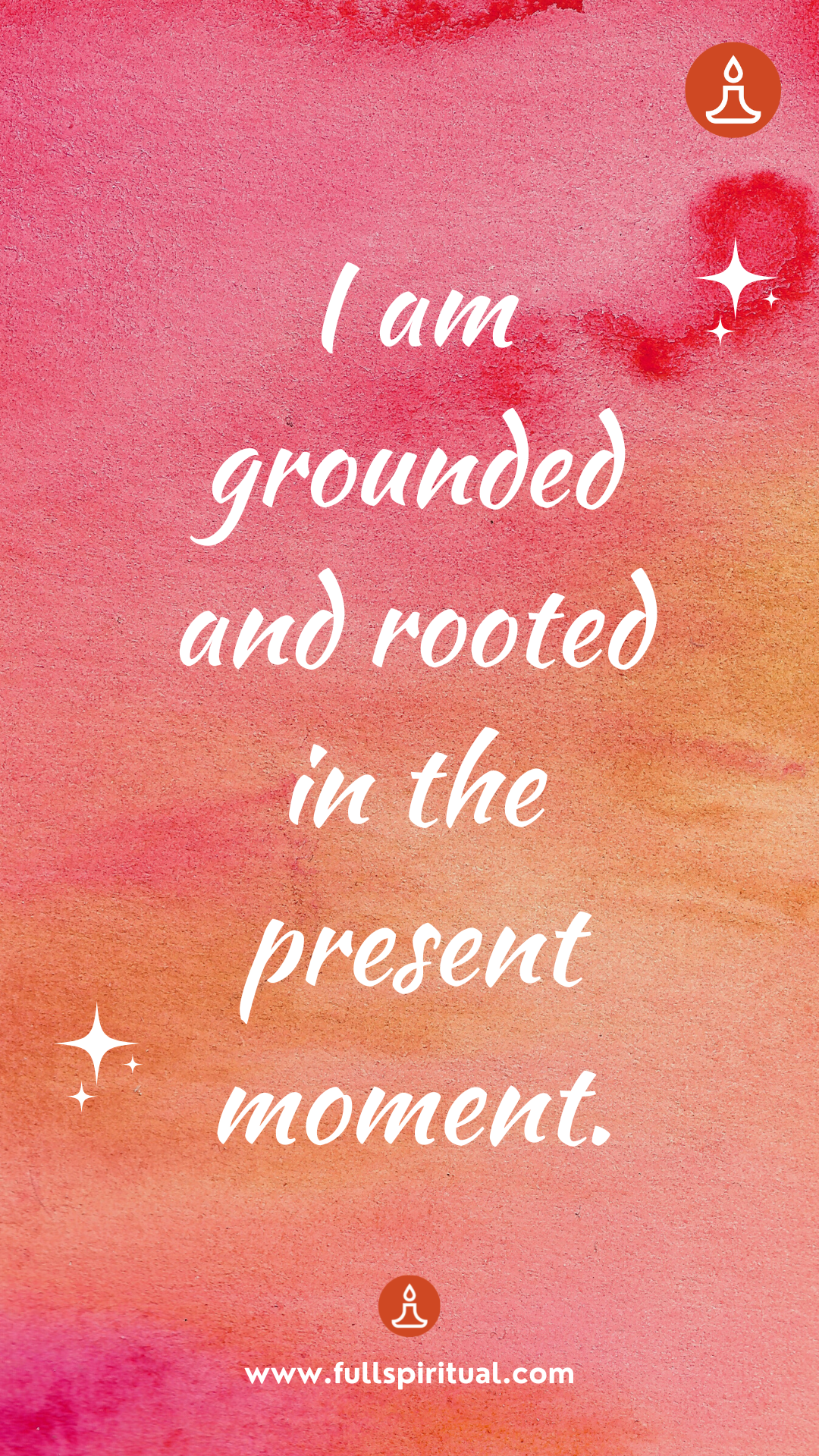

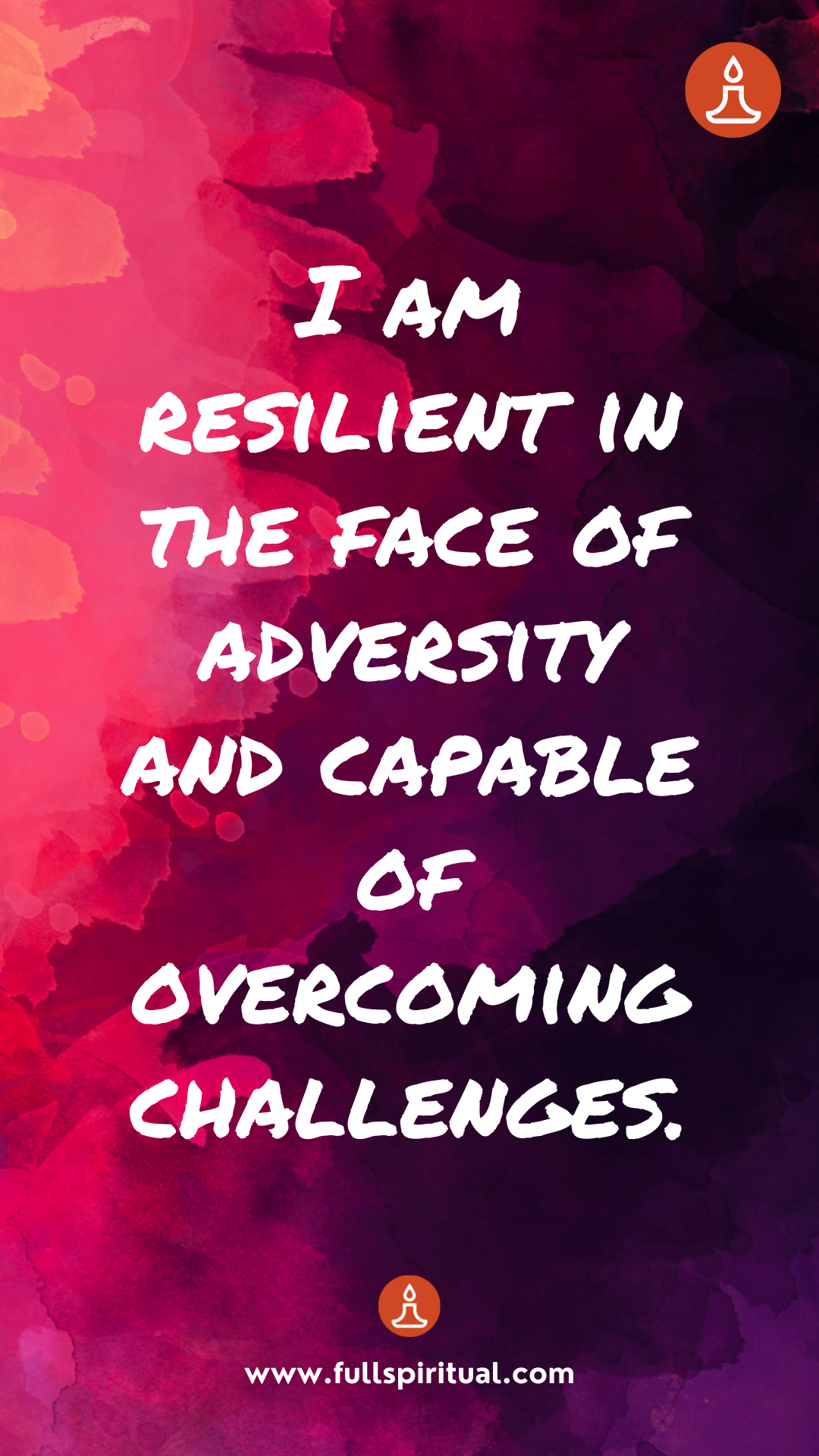


What are the symptoms of a blocked root chakra?
When the root chakra is blocked, individuals may experience feelings of fear, insecurity, instability, and anxiety. Physical symptoms can include fatigue, low energy levels, lower back pain, frequent headaches or migraines, digestive issues such as constipation or bloating, and a tendency to catch colds easily.
Emotionally speaking, someone with a blocked muladhara chakra may feel disconnected from their physical body and environment. They may also struggle to develop trusting relationships with others or find it difficult to take on new projects or challenges due to a lack of confidence in their abilities.
Finally, spiritually speaking they may have difficulty connecting with their sense of purpose in life.
How do I unblock my root chakra?
Unblocking the root chakra is a process of reconnecting with your body, grounding yourself, and being in the present moment. The most important step to unblocking your root chakra is to practice meditation and mindfulness. Visualizing a red light at the base of your spine can help open up energy blockages.
Additionally, engaging in physical activities like yoga or tai chi can be beneficial as they help strengthen your connection to the earth while stimulating energy flow throughout your body. Eating nutrient-dense foods such as legumes, nuts, seeds, and dark leafy greens can also be helpful for stimulating the energy flow in the body.
Finally, spending time in nature and connecting with the earth through activities such as walking barefoot on grass or sand can provide great healing benefits for your Muladhara chakra.
What happens when the Muladhara chakra is activated?
When the Muladhara chakra is activated, it helps to bring about a feeling of security and grounding. It can help to create a strong connection between the physical body and the spiritual realm, allowing us to feel more balanced and centered.
Activating this chakra can also promote feelings of prosperity, abundance, and success. It encourages us to take risks and trust our intuition, enabling us to make decisions from a place of power rather than fear. The energy associated with this chakra is that of survival instincts, self-preservation, and personal boundaries, when we are in tune with this energy, we are able to better protect ourselves by setting healthy boundaries.
Additionally, activating the Muladhara can benefit our physical health by providing energy for organs located near the base of the spine such as the kidneys and adrenal glands. Ultimately, it can bring about a sense of peace and security which allows us to move forward in life with confidence.
What happens when the root chakra is blocked?
When the root chakra is blocked, it can have a number of adverse effects on physical, mental, and emotional well-being. It may cause feelings of insecurity, fear and anxiety. Physically, it can lead to digestive issues, fatigue, poor circulation and lower back pain. Emotionally, it can lead to depression and difficulty concentrating.
Additionally, people with blocked root chakras may find that they are unable to make decisions or feel disconnected from their environment. They may also experience difficulties in connecting to others or maintaining relationships.
To unblock the root chakra and re-establish balance in the body, individuals should focus on grounding activities such as yoga, tai chi or qigong; eating nutrient-dense foods; and staying connected to nature. Practicing mindful awareness and affirmations can also be helpful in restoring balance to this powerful energy center.
How do you know if your root chakra is activated?
When your root chakra is activated, you will feel a sense of connectedness and stability in your life. You may experience feelings of security and belonging. Physically, you may feel a tingling or warmth in the area around your tailbone and legs. You may also notice improved digestion and increased energy levels.
Other signs that indicate an activated root chakra include feeling more grounded, having better posture, improved sleep quality, being more present in the moment, and finding it easier to manage stress and fear. When your root chakra is unbalanced, you are likely to feel anxious or disconnected from yourself and others; if this happens, it’s important to seek professional help to restore balance.
What causes blocked root chakra?
The root chakra is located at the base of the spine and is related to our sense of safety, security, and belonging. When this chakra is blocked, it can lead to a feeling of insecurity or fear. Common causes of a blocked root chakra include trauma, financial instability, major life changes, grief, or loss. It can also be caused by unhealthy relationships with family or friends that leave one feeling unsupported or insecure.
Other factors that can contribute to a blocked root chakra are lifestyle choices such as poor diet and exercise habits, lack of sleep, and excessive stress. By addressing these issues and finding ways to better support ourselves emotionally and physically, we can open up the blocked energy in our root chakra and begin to feel more grounded and secure.
Takeaway
The root chakra is a crucial component of the chakra system, responsible for our sense of grounding, stability, and security.
By understanding the characteristics of the root chakra and identifying imbalances, individuals can use various techniques to balance their chakra system, such as meditation, yoga, Reiki, crystals, and aromatherapy.
With a balanced root chakra, individuals can experience a greater sense of safety.

